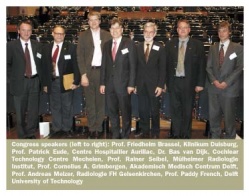The 1st International High Tech in Medicine congress
Prevention is better than cure - use the technology! A report from the 1st International High Tech in Medicine congress.

The 1st International High Tech in Medicine congress (held in October at the House of Technology (Haus der Technik), Essen), highlighted advances such as molecular imaging, micro- and nano-medicine, micro-sensors, sensor networks for patient monitoring, cochlear implants, digital developments, IT and much else in a remarkable array of present and promising technologies for patient care. However, the actual level of uptake and use of many advances - by health ministers and healthcare authorities - is ever a thorn in the side of researchers, developers and those practicing medicine.
‘It’s a disgrace,’ said the congress president Professor Rainer Seibel, of the Mülheim Radiology Institute, ‘that 39,000 people a year still die of colon cancer, seeing how we are now able to detect polyps as small as 2mm in size. 90% of all patients could be saved. Preventive examinations, using the latest technologies, could help detect and treat pathological changes in the body at an early stage - before they can cause serious harm. The German healthcare system spends an annual €2,700 a head on curative measures, but only €2.70 a head on prevention.
‘Japan has demonstrated how it is possible to cut down spending on curative measures by increasing the spend on sensible prevention,’ he pointed out. ‘Preventive measures such as full-body-checks with CT, MRI and ultrasound are considered standard routine examinations and are available to the general public. The per-head cost of healthcare in Japan is around €1,400, only about half of that in Germany.
‘Prevention must become our utmost priority to ensure the survival not only of people but also of the German healthcare system. To achieve this we need to streamline and simplify processes in the healthcare system. Interdisciplinary co-operation, in all areas of healthcare, is the key to success. acatech (see box) is a forerunner of such an interdisciplinary network. The organisation, which unites 250 experts from science & technology and industry considers itself a forum for the critical investigation of current engineering science questions, which are discussed in an interdisciplinary manner on a political level.’
Details: Silke Wiedemann Mülheim Radiology Institute: wiedemann@mri.de
23.05.2006





